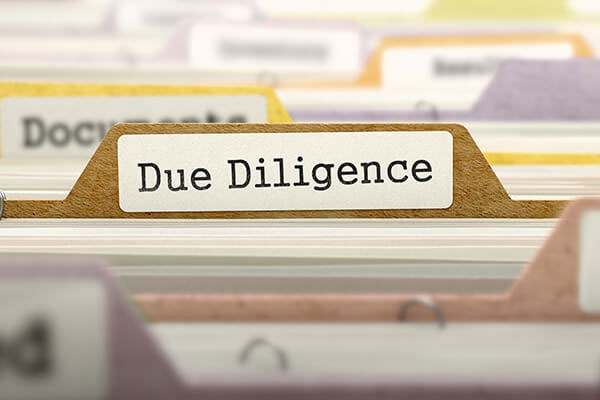Due Diligence Matters
Why due diligence?

Before committing to a transaction, you should perform due diligence on the product, business, or company (i.e. the “target”). Due diligence involves a review of the target’s following areas:
- Financial health: Historical/projected earnings, expenses, working capital needs, and valuation of assets and liabilities
- Material contracts: Leases, guarantees, credit agreements, loans, customer and supplier contracts, etc.
- Employee and management issues: Background checks on key personnel (board members and key management), quality and quantity of employees, payroll and bonus schedules, fringe benefits, severance pay
- Operations: IT systems, accounting systems and internal controls
- Competitors and industries: Position amongst its competitors and within its industry
However, certain aspects of the target may not be visible on paper. Careful examination is also required on the target’s contingent liabilities, lawsuits, regulatory issues, related party transactions, tax obligations, and problematic contracts. This is particularly true for private companies, in which the disclosure requirement is much lower than listed companies.
Once due diligence is done, you can make an informed decision by analyzing the costs and benefits of the transaction. If the due diligence process uncovers previously unknown issues, you can re-negotiate or call off the deal. For example, you can choose to re-negotiate the price or ask the seller to resolve its issues prior to the transaction. You must understand all the risks and obligations related to the transaction to avoid unpleasant surprises.
Due diligence process

The scope of the due diligence is tailor-made. While there are core elements (like financial health) to be addressed, other aspects are dependent on your concerns and the target’s risks and red flags. There are two types of due diligence. Buy-side due diligence is the buyer conducting an investigation to verify the information on a deal. Vendor due diligence is the seller providing an in-depth report to address the concerns of a buyer. As both types of due diligence are conducted by an independent 3rd party, they are equally useful for you to make an informed decision.
In theory, the due diligence process should take no longer than 60 days. You should not agree to a longer time frame in the Letter of Intent (“LOI”). However, the process may be delayed when there is difficulty obtaining the information from the sellers. You should communicate with the seller to have all documents ready to speed up the process.
How PKF can help
PKF is committed to helping you on the due diligence process. We conduct both buy-side and vendor due diligence, specializing in audit and tax due diligence. Please contact us to explore what opportunities could be relevant to you and your firm.


